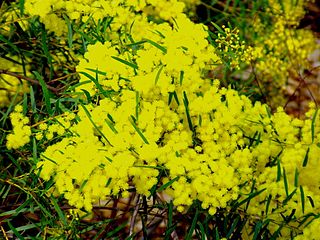
Acacia fimbriata, commonly known as the fringed wattle or Brisbane golden wattle, is a species of Acacia that is native along much of the east coast of Australia.

Acacia triptera, commonly known as spurwing wattle, is an erect or spreading shrub which is endemic to Australia.

Bossiaea buxifolia, commonly known as matted bossiaea, is a species of flowering plant in the family Fabaceae and is endemic to south-eastern Australia. It is a prostrate to weakly erect shrub with elliptic to egg-shaped or almost round leaves and yellow, red and purplish flowers.

Acacia lanigera, commonly known as woolly wattle or hairy wattle, is a tree species that is endemic south eastern Australia.

Acacia buxifolia, commonly known as box-leaf wattle, is shrub species that is endemic to eastern Australia.

Acacia flexifolia, commonly known as bent-leaf wattle or small winter wattle, is a shrub species that is endemic to eastern Australia.

Bossiaea foliosa, commonly known as leafy bossiaea, is a species of flowering plant in the family Fabaceae and is endemic to south-eastern Australia. It is an erect shrub with small, broadly egg-shaped to round leaves, and bright yellow flowers.

Acacia minyura is a tree or shrub belonging to the genus Acacia and the subgenus Juliflorae endemic to arid parts of central Australia.

Acacia amblygona, commonly known as fan wattle or fan leaf wattle, is a shrub belonging to the genus Acacia and the subgenus Phyllodineae that is native to Australia.
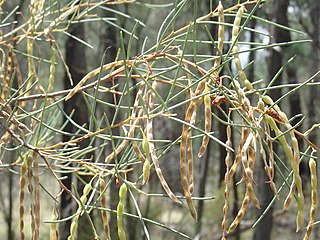
Acacia havilandiorum, also known as Haviland's wattle or needle wattle, is a shrub of the genus Acacia and the subgenus Plurinerves. It is native to areas in South Australia, New South Wales and Victoria.
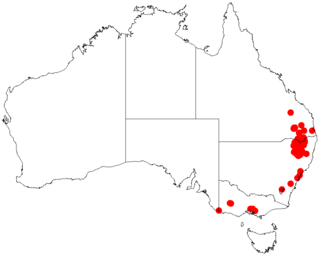
Acacia pruinosa, commonly known as the frosty wattle, is a species of Acacia native to eastern Australia.
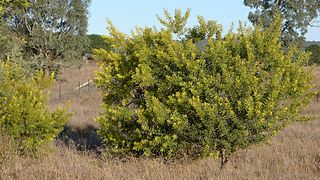
Acacia rubida, commonly known as red stem wattle, red stemmed wattle or red leaved wattle, is a shrub belonging to the genus Acacia and the subgenus Phyllodineae that is native to parts of eastern Australia.

Acacia conferta, commonly known as crowded-leaf wattle, is a shrub belonging to the genus Acacia and the subgenus Phyllodineae that is endemic to eastern Australia.

Acacia gladiiformis, commonly known as sword wattle or sword-leaf wattle, is a shrub belonging to the genus Acacia and the subgenus Phyllodineae that is native to parts of eastern Australia.
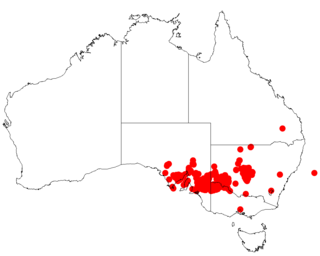
Acacia wilhelmiana, commonly known as dwarf nealie, Wilhelmi’s wattle and mist wattle, is a shrub belonging to the genus Acacia and the subgenus Plurinerves native to the mallee region of central and eastern Australia.

Acacia kybeanensis, commonly known as kybean wattle or kybeyan wattle, is a shrub of the genus Acacia and the subgenus Phyllodineae that is endemic to south eastern Australia.
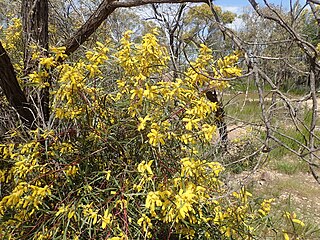
Acacia doratoxylon, commonly known as currawang, lancewood, spearwood or coast myall, is a shrub or tree belonging to the genus Acacia and the subgenus Juliflorae that is native to eastern and south eastern Australia.
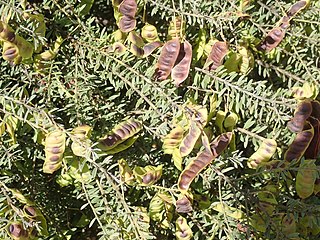
Acacia mariae, commonly known as golden-top wattle or crowned wattle, is a species of wattle native to central New South Wales.
Philotheca obovalis is a species of flowering plant in the family Rutaceae and is endemic to New South Wales. It is a small shrub with broadly egg-shaped to heart-shaped leaves with the narrower end towards the base, and white flowers tinged with pink and arranged singly in leaf axils.

Pultenaea glabra, commonly known as smooth bush-pea, is a species of flowering plant in the family Fabaceae and is endemic to eastern New South Wales. It is an erect shrub with glabrous stems, linear to egg-shaped leaves with a concave upper surface, and yellow to red and orange flowers.



















